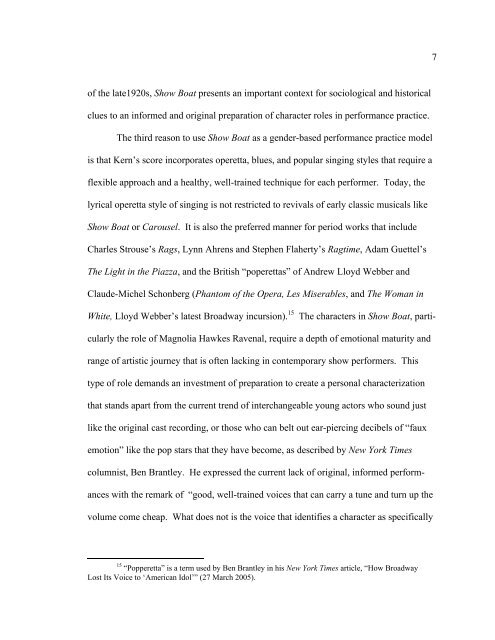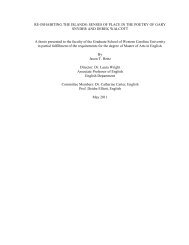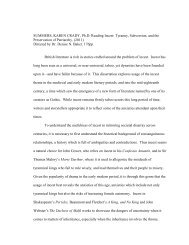Song Character Analysis Worksheet - The University of North ...
Song Character Analysis Worksheet - The University of North ...
Song Character Analysis Worksheet - The University of North ...
You also want an ePaper? Increase the reach of your titles
YUMPU automatically turns print PDFs into web optimized ePapers that Google loves.
<strong>of</strong> the late1920s, Show Boat presents an important context for sociological and historical<br />
clues to an informed and original preparation <strong>of</strong> character roles in performance practice.<br />
<strong>The</strong> third reason to use Show Boat as a gender-based performance practice model<br />
is that Kern’s score incorporates operetta, blues, and popular singing styles that require a<br />
flexible approach and a healthy, well-trained technique for each performer. Today, the<br />
lyrical operetta style <strong>of</strong> singing is not restricted to revivals <strong>of</strong> early classic musicals like<br />
Show Boat or Carousel. It is also the preferred manner for period works that include<br />
Charles Strouse’s Rags, Lynn Ahrens and Stephen Flaherty’s Ragtime, Adam Guettel’s<br />
<strong>The</strong> Light in the Piazza, and the British “poperettas” <strong>of</strong> Andrew Lloyd Webber and<br />
Claude-Michel Schonberg (Phantom <strong>of</strong> the Opera, Les Miserables, and <strong>The</strong> Woman in<br />
White, Lloyd Webber’s latest Broadway incursion). 15 <strong>The</strong> characters in Show Boat, parti-<br />
cularly the role <strong>of</strong> Magnolia Hawkes Ravenal, require a depth <strong>of</strong> emotional maturity and<br />
range <strong>of</strong> artistic journey that is <strong>of</strong>ten lacking in contemporary show performers. This<br />
type <strong>of</strong> role demands an investment <strong>of</strong> preparation to create a personal characterization<br />
that stands apart from the current trend <strong>of</strong> interchangeable young actors who sound just<br />
like the original cast recording, or those who can belt out ear-piercing decibels <strong>of</strong> “faux<br />
emotion” like the pop stars that they have become, as described by New York Times<br />
columnist, Ben Brantley. He expressed the current lack <strong>of</strong> original, informed perform-<br />
ances with the remark <strong>of</strong> “good, well-trained voices that can carry a tune and turn up the<br />
volume come cheap. What does not is the voice that identifies a character as specifically<br />
15 “Popperetta” is a term used by Ben Brantley in his New York Times article, “How Broadway<br />
Lost Its Voice to ‘American Idol’” (27 March 2005).<br />
7

















